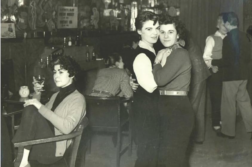 Dying City
Dying City
by Christopher Shinn
Produced by Lincoln Center Theater
ATTENDING A PERFORMANCE of this new drama by Christopher Shinn is something like watching a traffic accident in slow motion—and I mean that in the best way. You watch the cars coming at wrong angles in utter fascination and wish you could do something to stop the inevitable crash. But you are paralyzed in your role as observer and must simply let the disaster happen.
Dying City is played in the round on a large square platform that through the course of the play’s uninterrupted ninety minutes makes a full 360 degree turn, a device that produces quite literally a continually shifting point of view. The play is a creepily intimate examination of a young widow, Kelly, who’s about to pack up and move from her apartment. She is unexpectedly visited by her brother-in-law, Peter, a self-involved gay actor who is also his dead brother’s twin. Playwright Christopher Shinn gives us a two-actor play with three characters, each scene shifting between the night of Peter’s unexpected visit to Kelly in 2005 and the eve of her husband Craig’s departure for the war in Iraq in 2004.
Pablo Schreiber, so affecting last year in the revival of Clifford Odets’ Awake and Sing, does double duty here in a subtle but incisive shift from Peter, all stumbling apologies for his surprise visit mixed with career-climbing single-mindedness, and Craig, a man bedeviled by private demons who seems to be leaving his past, his country, and his wife behind all in one fell swoop.
Rebecca Brooksher, a relative newcomer, is a lovely wan and willowy blond given the equally tough role of responding on multiple levels to two identical-looking but otherwise significantly different brothers. From the start, we sense her deep misgivings about Peter’s unexpected intrusion into her private misery, though it will take the full length of the play for her to express this. We might well question the passive tendencies in Shinn’s Kelly, for we learn she is a psychotherapist, a woman experienced enough to interpret human behavior and foibles but, it would seem, too stunned by grief to express her own needs or to make her own demands until quite late in the play. While our sympathies are with her, Kelly withholds so much, as Craig and Peter do from her, that some may well lose patience.
Shinn uses his mirrored time structure to peel the onion of his character’s wounded relationships. What is slowly revealed is a fractured marriage beset by deceit that Craig is leaving behind, and the wary, even manipulative neediness that underlies Peter’s desire to reconnect to his widowed sister-in-law, perhaps absolving him of his own guilt about his straight twin, whom he alternately admired and feared.
Shinn’s dialogue is admirably authentic, indeed disturbingly so. It gives us the fumbling rhetorical feints of people who use indirection to expose themselves. And the director, James Macdonald, an Associate Director at London’s Royal Court, lets his actors play the silences with inchoate tensions worthy of Pinter.
There is no doubt that the slow revelations of emotional cruelty that each of these three has had inflicted on them in their childhoods, or that they have since visited upon one another, accounts for a disturbing evening in the theater. Still, there is a lingering sense of missed opportunity; a fair amount of what we learn is revealed in parcels of exposition about the past rather than as fully dramatized moments played before us on that incrementally revolving stage. Likewise the use of the Iraq War and the events of 9/11 in Dying City, intended no doubt to underscore the play’s themes of lies and self-deception, provide relatively thin stilts for the action rather than a sturdy foundation.
None of these misgivings finally diminishes the gravity of Shinn’s mission, nor breaks the spell of watching this nocturnal car wreck. Two young actors give three very fine performances, and a young playwright gives us intimations of still greater achievements to come.





